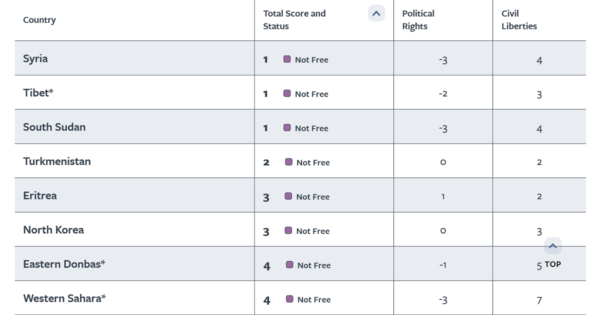Tibet is the least-free country on Earth, in a tie with South Sudan and Syria, according to new rankings from the watchdog group Freedom House.
Tibet—a historically independent country that China has brutally occupied for over 60 years—has a global freedom score of 1 out of a possible 100 in Freedom House’s Freedom in the World 2022 report.
“The world is seeing right now what happens when authoritarian governments invade their smaller neighbors. Although China’s occupation of Tibet has lasted for over six decades, Tibet’s plight remains a warning to freedom-loving people everywhere,” said the International Campaign for Tibet, an advocacy group in Washington, DC and Europe that promotes human rights and democratic freedoms for the Tibetan people.
ICT added: “In order to protect freedom around the globe, we have to demand it in the places that are least free.”
Second year in a row
This is the second year in a row that Tibet has tied for worst in Freedom House’s rankings.
In 2021, Tibet and Syria shared the lowest spot in the global freedom scores. This year, South Sudan joined them at the bottom.

For the second year in a row, Tibet ranks as the least-free country on Earth in Freedom House’s global freedom scores. This year, Tibet is in a tie with South Sudan and Syria at the bottom of the list.
Tibet’s 2022 score of 1 out of 100 includes a minus 2 out of 40 for political rights and 3 out of 60 for civil liberties. Both South Sudan and Syria have a score of minus 3 for political rights and 4 for civil liberties.
Freedom House says its full 2022 report on Tibet will be available soon.
China’s repression in Tibet
Tibet’s ranking in the global freedom scores reflects the Chinese government’s severe human rights violations against the Tibetan people:
- Since 2009, over 155 Tibetans have self-immolated, lighting their own bodies on fire in a desperate protest against China’s destruction of their culture and way of life.
- China’s atheist government is planning to appoint its own Dalai Lama to replace the now 86-year-old Tibetan spiritual leader. The Chinese-appointed Dalai Lama is expected to be loyal to Beijing.
- Chen Quanguo, the architect of China’s genocide of the Uyghurs, previously served as China’s top leader in the Tibet Autonomous Region—which spans about half of Tibet—where he developed a system of mass surveillance and militarization that has only grown since.
- According to researcher Adrian Zenz, China created a large-scale coercive labor program in the Tibet Autonomous Region that pushed more than half a million rural Tibetans off their land and into military-style training centers in just the first seven months of 2020.
- China is also taking aim at the Tibetan language. Mandarin is now the language of instruction in 95% of Tibet’s schools.
- More than 270 Tibetan political prisoners are currently languishing in China’s prisons, where they routinely face torture and abuse.
Global support for Tibetans
In contrast to China’s rising repression, governments around the world are increasingly taking action to support the Tibetan people.
- In 2020, the US passed the Tibetan Policy and Support Act, a far-reaching piece of legislation that dramatically upgraded US support for Tibetans. The TPSA made it official US policy that only the Dalai Lama and the Tibetan Buddhist community can decide on his succession. If any Chinese officials try to interfere in that process, they will face sanctions.
- The US also passed the Reciprocal Access to Tibet Act in 2018, taking aim at China’s unfair policy of keeping American journalists, diplomats and ordinary citizens out of Tibet. As part of RATA, the State Department has banned Chinese officials from entering the US over their role in keeping Americans out of Tibet.
- At the end of 2021, US Secretary of State Antony J. Blinken named veteran diplomat Uzra Zeya as the new special coordinator for Tibetan issues. The appointment of Zeya—who serves concurrently as undersecretary of state for civilian security, democracy and human rights—followed bipartisan letters from the House and Senate encouraging the new special coordinator to work with Congress to advance US policy on Tibet.
- During his campaign, President Joe Biden issued a statement saying the “Biden-Harris administration will stand up for the people of Tibet.” Biden promised to push the Chinese government to give Americans access to Tibet and return to direct negotiations with Tibetan leaders.
- Before last month’s Beijing Winter Olympics, 66 parliamentarians from 16 EU countries published an op-ed urging the European Union and its member states to refrain from attending the Games in any capacity “unless the Chinese government demonstrates a verifiable improvement in the human rights situation in Hong Kong, East Turkestan, Tibet, Southern Mongolia, Macao and elsewhere.”

